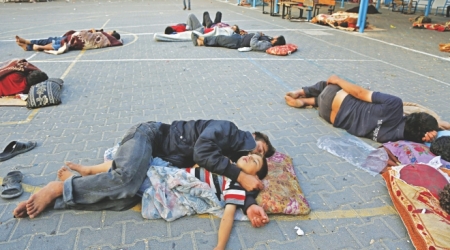As an intense volley of rocket fire resumed across the borders of the Gaza Strip, just following the end of a 72-hour temporary truce on Friday, Gazans who had returned to their homes during the shortlived ceasfire are now, once again, seeking shelter at a number of local hospitals and schools — to which some 200,000 people had previously fled, amdist near incessant Israeli shelling on Gaza’s civilian infrastructure.At least 153 schools in Gaza, including 90 of which are run by United Nations workers, have been damaged by Israeli air strikes or shelling during the conflict, according to UNICEF.
‘The schools aren’t safe either, they hit the schools,’ says Gaza resident Saeed Masri.
Ma’an reports that, just three hours after the ceasefire ended, a missile hit the roof of a building opposite the Jabaliya apartment where Mr. Masri was staying with relatives, after his own neighborhood was shelled.
Cradling his baby daughter, Saeed took flight, Friday, with little hope that even a UN facility could protect his family.
‘Why is the whole world sleeping… why?!’ he asks. ‘Children and women are being targeted, and the world is sleeping.’
In Beit Hanoun, a steady stream of families could also be seen trudging along the road to a school, Ma’an further reports. Others riding donkey carts and cars packed with mattresses and clothes rattled past them.
Gaza’s catastrophic human displacement crisis is morphing into a housing crisis of massive proportions with an early estimate that 65,000 have had their homes destroyed, UNRWA spokesman Chris Gunness recently stated.
That statistic is likely to rise, he says. ‘A man-made homelessness crisis on an epic scale is unfolding.’
‘The last seven years have shown that reconstruction under blockade is unsustainable. Look where the blockade led; to war and industrial scale destruction. Huge swathes of Gaza have been leveled. We cannot rebuild it with our hands tied behind our backs. The blockade must end. We are beyond the realm of humanitarian action alone. All those directly and indirectly responsible for the carnage and destruction must engage.’
Israel has legitimate security concerns, Gunness says. But collective punishment has been ineffective in dealing with them. It is time for Israel to enable, not disable. It is time for the world to recognize the blindingly obvious; that the Gaza conflict requires a political solution.
UNRWA estimates that 70 per cent of all those affected by the housing crisis are refugees.
The organization is responsible for these refugees, who will require UNRWA provisions of a broad range of services, including reconstruction, repairs, rental subsidies while homes are rebuilt, as well as health services, psycho-social support, food, cash and education.
Then, there is a question of repairing and rebuilding public infrastructure in refugee camps – water, sewage and electricity. This is an urgent priority. Without it people simply cannot go home. Rubble removal is also an important aspect of this, for which UNRWA is planning to use local workers, in order to boost the local economy.
As of January 2014, there were approximately 5.4 million Palestinians registered as refugees in various parts of the world. Palestinians now make up the largest refugee group in the entire world.
‘We need to wake from the self-imposed delusion that you can contain Gaza with humanitarian assistance,’ Mr. Gunness further asserts.
‘It is an unsustainable delusion.’
See also: ‘Israel Deliberately Attacking Medical Workers in Gaza, Amnesty Says’
PLO: Over 485,000 People Now Displaced in Gaza

